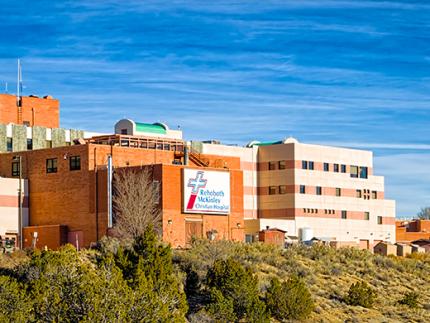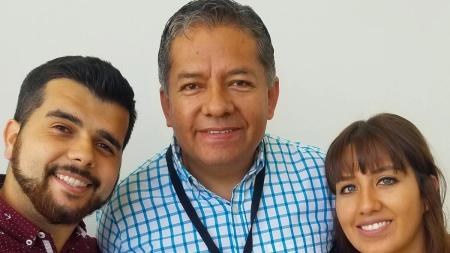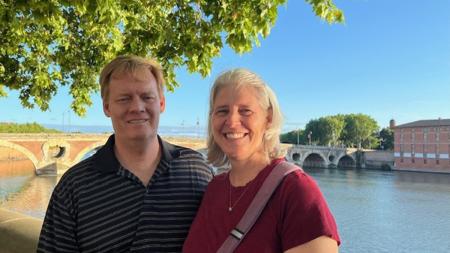Treating COVID-19 in Navajo Land

A severe COVID-19 outbreak has swept across the Navajo Nation, placing it right behind New York and New Jersey in per- capita infections.
Taking care of many Navajos is Rehoboth McKinley Christian Health Care Services, the 1980s-era merger of a Christian Reformed Church hospital and a county hospital with Roman Catholic connections.
Located in Gallup. N.Mex., the intensive care unit and other spaces in the 60-bed hospital are filled with patients, most with COVID-19, and health care personnel are rushing round the clock to battle the virus.
The massive 27,000-square-mile Navajo Nation, which includes parts of New Mexico, Arizona, and Utah and has a population of about 175,000, currently has 1,716 cases of COVID-19, from which 59 persons have died since the pandemic began.
“In New Mexico, the native population makes up 14 percent of the state, but they make up more than 30 percent of the COVID-19 cases,” said Carol Bremer-Bennett, who is Navajo and served as superintendent of Rehoboth Christian School before being named the director of World Renew-U.S.
Bremer-Bennett characterizes the fight against the virus as being like a war in which personnel are deployed to fight the disease that particularly attacks the lungs with an aggressive pneumonia and, increasingly, doctors are finding, appears to cause heart attacks and strokes.
In the midst of this, the hospital is straining to locate items necessary for its staff and patients: hand sanitizer, masks, ventilators, and even dialysis machines.To help fill the needs, people across the CRC have been knitting masks and shipping them to the reservation. Others have crafted gowns from plastic building material called Tyree and sent them there.
According to a memo issued by Bremer-Bennett on April 27, “World Renew Disaster Response Services has partnered with RCA Global Mission to launch an initiative to come alongside the Navajo Nation. . . . World Renew is responding with safe water and food for those currently vulnerable to infection. DRS and RCA Global Mission are working with Rehoboth Christian School to deliver the vital water and food supplies these families need in order to stay home and stay safe.”
A Doctor
As an internal medicine and infectious disease specialist, Dr. Chris Gonzaga has been busy treating patients with COVID-19 in the hospital as well as examining those flocking to the hospital in ambulances and pickup trucks or simply walking through the doors coughing and sick.
Everyone who arrives, whether from the local Gallup-Rehoboth area or from far out on the rocky reservation, is usually dealing with a high temperature, an early indication of the sickness. Symptoms of the disease include a virulent type of pneumonia, heart and breathing problems, body tremors, and high fever.
“We’ve never had a pandemic like this before,” said Gonzaga, who was born in the Philippines and was encouraged to study medicine in the U.S. by Christian Reformed missionaries. He has served many key roles at the hospital, including chief of staff. And as medical experts around the globe have been finding out, this virus is mysterious. “We know some of the right things to do,” said Gonzaga, “but we’re not sure where all of this is going to go.”
On the reservation, people’s high susceptibility to the virus stems from a mix of things, said Gonzaga. For example, many do not have easy access to water — some 30 percent of families must travel many miles to get water to feed their animals, to cook, to wash their hands, and to drink). In addition, multiple generations of families — out of tradition or, more likely, need — live together on the reservation, making social distancing difficult to impossible. And, further, many Navajos have diabetes, hypertension, and other health conditions making them more susceptible to COVID-19, said Gonzaga.
“We still have a little capacity in our hospital, but with the numbers of patients who are coming in, that will be gone soon,” he said. As he looked around, peeking into one room where nurses attended a COVID-19 patient, he added, “We suspect we are nowhere near the peak of infections yet.”
A Nurse
Sara Pikaart is an OB-GYN nurse who has trained to take up far-different responsibilities in the COVID-19 ICU. She loved being a nurse for babies and new mothers, she said. But in this topsy-turvy time she felt God’s call to set aside what was pleasant and familiar and step up to the challenge at hand. Her decision has meant, for the sake of quarantine, that she is living separate from her family in a dorm room at Rehoboth Christian School.
“Working in the ICU is a whole new situation for me,” she said. “Nearly all of the patients I’m caring for are Native American. They come from all over the reservation — and they are so sick.”
Pikaart also sees patients from the nearby Zuni Pueblo. Located in a small village near Zuni Christian Reformed Church, families have continued to do religious ceremonies that include dancing together to ward off the virus. Trying to explain to them the reality and course of the virus is very hard, she said, even as they lie in a bed shivering with a high temperature.
Pikaart has come to realize that as she cares for very sick patients, no matter how much she does, many of them will likely die. She knows she must steel herself to the inevitable and at the same time not reduce her efforts to keep them alive.
“I know we are here to serve God, whatever God wants us to do. . . . I have a strong calling to take care of the sickest patients,” she said. But at the same time, she added, “It’s more devastating for us than ever before working in the hospital right now.”
At one point the other day, she said, she found herself leaning down and gently adjusting a breathing apparatus. The eyes of the patient watched her with pain, and yet somewhere in there was hope. And hope, she said, is what drew her from the OB-GYN unit, where new life is born, to this place where ventilators help people breathe, tubes are used to feed patients, and life and death seem to hang in a balance in the stuffy air.
A School Superintendent
Given how much contact he has had with people who are infected with COVID-19, Bob Ippel decided last week to get tested. Thankfully, the results showed that he is still negative for the deadly virus.
He attributes the precautions he has taken — hand washing, social distancing — for steering clear of the virus. But the superintendent of Rehoboth Christian School said he is not fooled; he is not out of the woods. He remains busy, supporting and helping to direct the cooking of meals in the school cafeteria and delivering them around the community and beyond to far-flung places on the reservation. His connections to people with the disease will remain, he said.
Along with daily meals, the school is trying to take computers such as Chromebooks and tablets to students who need them right now to study online.
“Unfortunately, distance learning doesn’t work for 30 percent of our students. They have no internet,” he said.
As best they can, teachers are staying in touch with students during this time, often over the phone but also sometimes at their homes.
“We have started putting together packages to give families enough groceries and water for a week,” said Ippel. This is being done with help from World Renew’s Disaster Response Services, and the Reformed Church in America.
Even though the pandemic has caused pain in many families, said Ippel, he hopes that it might eventually lift some people’s awareness of issues and hardships that this virus is creating around the world.
“We need to seek the humility of God to open our eyes to what God provides, even in the face of this terrible crisis,” he said.
In hopes of helping to do this, Ippel makes sure that the school continues to hold its weekly chapel service. “We want to give students the chance to pray. Now is not the time to forget,” he said.
A Chaplain
Kris Pikaart, sister-in-law of Sarah, the nurse, works as a Christian Reformed chaplain in the COVID-19 unit. Hallways there are packed with medical equipment and doctors and nurses discussing treatment options for patients. For several weeks now, she has been talking with the medical staff there about their experiences and making her way around bulky machines, covered with protective plastic sheets, to meet with patients, she said.
In the past, she could sit at someone’s bedside and hold their hand as they talked. These days, she said, she generally sits at the end of the bed. If the patient is not too sick or on a ventilator, they can talk.
“This week the virus hit us hard,” said the chaplain. “It has been an incredibly consuming ministry,” she said.
As a part of her work, Kris Pikaart has joined with Ina Burmeister, director of development, to find downtown motel rooms in which people living in a local homeless shelter can stay on their own. The bulk of these people are infected with the virus, she said, and they can stay in place in their motel rooms. People check on them regularly to make sure they are still holding up.
A Task Force Leader
Tyell Platero is a nondenominational pastor working with the Navajo Nation Christian Response Team, a multidenominational effort — including the CRC — trying to get food out to the most remote areas of the reservation, to places like Naschitti. President Jonathan Nez of the Navajo Nation requested that this group get food and cleaning and other supplies such as firewood out to the more remote areas of the reservation.
Supported by a range of CRCs across the reservation and other churches, Platero took on the job only a week or so ago.
“Church leaders across the reservation are helping to identify where the greatest needs are,” he said. “We meet many families who have nothing to eat. And so, by helping out, this is a way for churches to serve the needs of their communities.”
He noted that Rehoboth Christian High School in Gallup is also serving as a pick-up point for people who can come in and get supplies.
As he serves in this role, Platero said he sees many churches stepping up to care for their people and to do as they can for others not in their church. At the same time, he said, he has also encountered churches that want no help. Often these are churches that still meet on Sundays and believe that through faith and intense prayer — and not COVID-19 tests or trips to the hospital — they will ensure that they remain safe.
“My take is that we are not out of the woods yet. This is going to be a prolonged operation. I think that even when COVID-19 becomes history, we’ll still be dealing with the fallout.”


